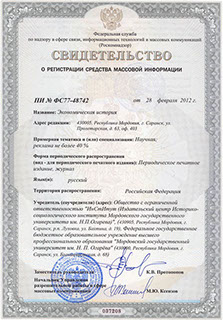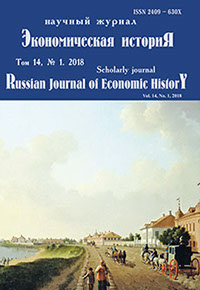Экономическая историЯ
Russian Journal of Economic History
ISSN 2409-630X (Print)
ISSN 2618-916X (Online)
Expert board:
- Scientific Council of RAS on economic history;
- Research and Educational Center «The economic history of Central Russia and the Middle Volga region» of Ogarev Mordovia State University;
- Center of Economic History of Lomonosov Moscow State University
Navigation
Certificate of registration

ISSN 2409-630X
DOI: 10.15507/2409-630X.040.014.201801.059-072
V. V. Naumkin
Full Member, Russian Academy of Sciences, Dr. Sc., Professor, President, Institute of Oriental Studies, RAS,
Moscow, Russia, e-mail: director@ivran.ru
TRADE BREAKTHROUGH OF THE USSR TO ARABIA (1920s–1930s): UNREALIZED OPPORTUNITIES
The article provides an insight into the phenomenon of a Soviet “Trade Breakthrough” in the 1920-s – 1930-s into the Kingdom of Hejaz (Saudi Arabia) – the first Arab state with which the USSR established diplomatic relations. Promoting Soviet merchandise to the Arabian market was one of the top priorities for the Soviet diplomats from the very outset, however the task of propagating the revolutionary ideas here was never assigned because of the low level of the country’s development. The movement for the unification led by Abdul Aziz bin Saud was viewed by the Soviet leadership as anti-imperialistic, which predetermined Moscow’s propensity towards being in sympathy with Wahhabism. Special emphasis was laid on the sales of Soviet oil gasoline and kerosene, as well as certain categories of everyday necessities. The Soviet Consulate General was charged with the urgent assignment of making it possible to sign a political and trade agreement with the Kingdom. The accomplishment of the task was hampered by the resentment on behalf of the pro-British Hejaz merchant circles and pro-British elements within the King’s entourage, the apprehension harbored by the King over the possibility that his relations with the UK might get worse, and also the bureaucracy and sluggishness of the Soviet foreign trade organizations. The article lifts the curtain over sharp controversy that existed among various Soviet agencies, who were engaged in maintaining relationships with foreign nations. The hostile activities undertaken by the British seeking to undermine the relationships between the USSR and the Kingdom are revealed. The importance of the unsolvable problems of the freedom of pilgrimage for Soviet Muslims to the Holy Sanctuaries of Islam and the payment of compensation for the nationalized waqfs for the Saudi side is highlighted. On the basis of documents made available by the Foreign Policy Archive of the Russian Federation it is effectively proved that if Moscow agreed to granting a loan to the Kingdom, the King was prepared to embark on the course of pursuing exceptionally profound ties with the USSR. The inability of the Kingdom to repay its “oil debt” rapidly was a serious impediment on the way of forging stronger relations with the Kingdom. All relations were severed after the Soviet representatives in Hejaz fell victims of the purges.
Keywords: trade, PCFA, Saudi Arabia, Chicherin, oil, hajj, waqf, treaty.
For citation: Naumkin V. V. Trade Breakthrough of The USSR to Arabia (1920s–1930s): Unrealized Opportunities. Ekonomicheskaya istoriya = Russian Journal of Economic History. 2018. 14(1). Р. 59–72. DOI: 10.15507/2409-630X.040.014.201801.059-072
© Ogarev Mordovia State University. History and Sociology Institute, 2017
68, Of. 411, Bolshevistskaya St., 430005, The editorial office of the scholarly journal «Russian Journal of Economic History»
Tel.: (8342) 24-25-90; 27-07-11, Fax: (8342) 24-25-90, E-mail: jurnal-econom-hist@isi.mrsu.ru
Designed by A. Napalkov, Email: napalkov@isi.mrsu.ru

